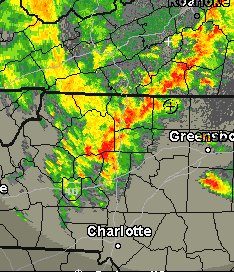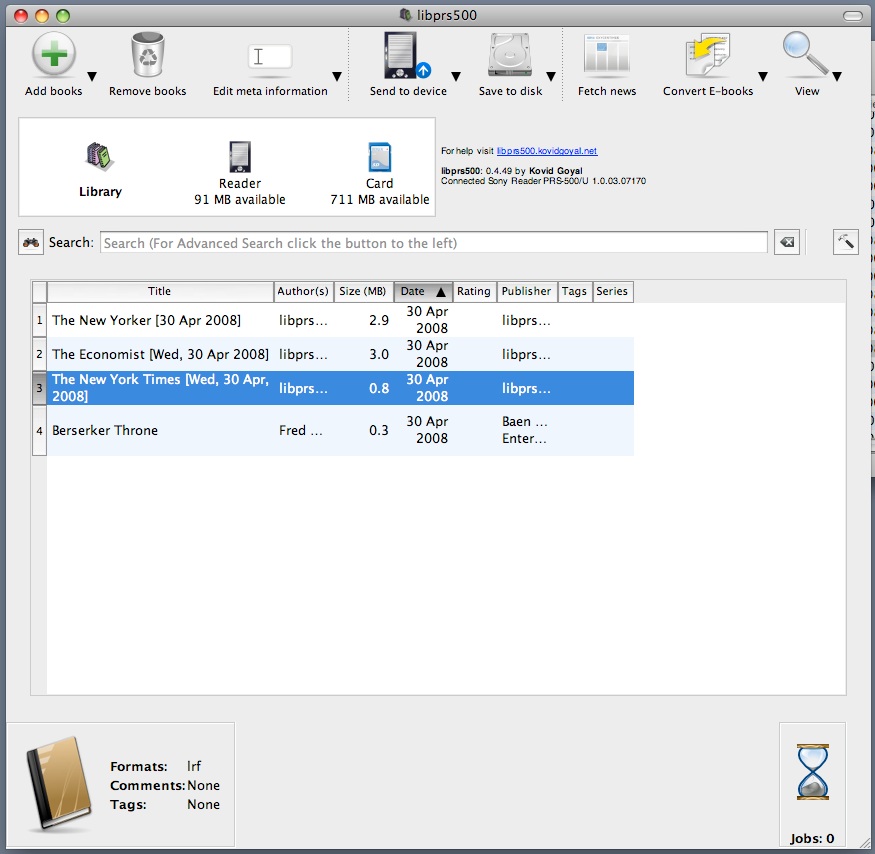What could be more exciting than the first day lily to appear on an acre of scraped-over but slowly recovering land. There was an eighth of an inch of rain during the night, enough to make the cover crops pretty happy for a few days.
Speaking of miracles…
I came across this quote a couple of days ago at survivalblog.com:
There are only two ways to live your life. One as though nothing is a miracle. The other is as though everything is a miracle. — Albert Einstein
I don’t think Einstein was deluded about the all-knowingness of science. I think he understood perfectly well, though he longed to understand, that he didn’t have a clue why grass grows or why roses bloom.
I’ve tried to verify this Einstein quote and see what its context might be, but I’ve not succeeded so far. Einstein was too complex to go around making up aphorisms. If the quote is authentic, there must have been some interesting context.
The miracle of May
Mountain View Road, Stokes County, May 23. This is the kind of grass I want — deep, unmowed grass that swallows pickup trucks. Note the color of the sky close to the horizon. That is Carolina blue.
More of Mama’s roses, May 23, Yadkin County. The amazing thing is, these blooms had not even started opening last week when I was there.
… and still more of Mama’s roses. By the way, the person who has done all the work of gardening on this old place for the past three years, and who has done a just remarkable job, is my sister’s husband, Graham. The older buildings and the homeplace are almost gone, and the land has been divided up, but the land upon which theses roses are growing has been in the family for at least four, if not five, generations. This rose bush, however, is only three years old.
Cover crops: slow going
I have many spots where silt collected after rain, and the soil looked flat and barren. But there was grass seed under there, and eventually the grass breaks through with a vengeance.
It’s been a constant challenge to get cover crops going on more than an acre laid bare. The overall result is still far from photogenic. The soil was brutally disturbed three times — first for the taking out the pine trees, then again for removing the stumps, and then again for putting in the septic tank. I flung a variety of seeds, at different times, onto different conditions — fescue grass, rye grass, red clover, and white clover. In places I have pretty good cover, but the roots are still shallow, and rain is needed more often than it comes. In the really tough spots where the topsoil was removed — the front ditch and beside the driveway — I’ve watered regularly with a hose. Into the bare spots I poked beans and peas. Anything resembling lushness is weeks or months away, but stuff is growing.
Crops in straight and orderly rows, nicely segregated? Ha! Maybe someday. I poked seeds wherever I thought they might grow. Here we have corn, clover, fescue, and cucumber all in one place. Whether I harvest corn and cucumbers is not my main concern this year. I’ll take anything that has roots and holds the soil. The variety also makes for good experiments. I’ll learn a bit about what wants to grow where.
The beans and peas I planted all around are coming up very enthusiastically. With decent rain and a bit more nitrogen, who knows what might happen.
The cantaloupes are flourishing…
… and the tomatoes are doing well.
I’ve won the war for the front ditch. I now have strong fescue and young clover there, so even in a heavy downpour it’s no longer likely to erode.
From Mama's house to my house
All these photos were taken yesterday. I let the GPS device pick a route from Mama’s house to my place in Stokes. I told the GPS device to pick a route that led past a particular place along the Yadkin River where I’d remembered seeing an old mill 30 years ago, and I told it to stay off the main roads. What a route! I knew some of the roads, but others were completely new to me. This was an amazingly scenic route that just happened to lead past the places where parts of three movies were filmed: Junebug (Pinnacle, Stokes County), Cabin Fever (Priddy’s General Store, Stokes County), and Leatherheads (Donnaha, Yadkin County). This area is rich in agricultural history. More posts on agricultural history another day. It took me along the foot of Pilot Mountain. The route also led past two old Stokes County resorts — Vade Mecum and Moore’s Springs — and it took me past the entrance to Hanging Rock State Park, not to mention downtown Danbury (the Stokes county seat) and Priddy’s General Store, where I stopped to get a Cheerwine and say hello to Jane Priddy-Charleville, who runs the store. It took me past a winery that I was not previously aware of, about which I’ll post another day.
Machinery in the mill on the Yadkin
More of the mill on the Yadkin
Cogwheel at the mill on the Yadkin
Cadillac in the barn by the mill on the Yadkin
The hardworking owner of the mill on the Yadkin
Moore’s Springs, Stokes County
Vade Mecum (Stokes County), now a summer camp
Another Yadkin Valley homestead
Residents of a Yadkin Valley homestead
Security guard at Priddy’s General Store
Bonjour, bluebirds
Finding country roads, with technology
I’ve always loved the backroads, and I thought I knew the backroads around here. But nothing knows the backroads like a GPS device.
I’ve had a hiker’s GPS unit for years, but it’s not smart enough to plot over-the-road routes and tell you where to turn. I’ve played with those things occasionally in rental cars, but they’re too complicated to learn how to use in a rent car. But last week I broke down and got me** a remaindered Garmin iQue M5 on eBay.
It got me*** to Madison easily. I had not previously been to Madison from here because I didn’t know how to get there. I also let the GPS device plot a new route to Mama’s house in Yadkin County. It found a backroads way that I would never have thought to try, and it cut two to four miles off the distance. If you accidentally or intentionally stray off the route, the device will warn you, recalculate a new route, and talk you back toward your destination. Often I’ve avoided trying backroads because I had no map, had no idea where the roads went, and I didn’t want to risk getting too lost. But an in-car GPS device frees you up to explore with confidence.
Within the next few weeks, I’m planning a road trip into the mountains along the Tennessee/Virginia line. I’m going to explore me** some backroads.
** Californians: Google “reflexive dative,” or see this or this. Don’t y’all miss my little seminars on Appalachian English?
*** This is not a reflexive dative but is rather a simple indirect object. 🙂
Stormy weather

3.5 inches of rain bears down on Stokes County
A violent storm came through the area Thursday night. There were tornadoes 40 or so miles away. Here in Stokes we got high wind, a bit of hail, and 3.5 inches of rain. The rain did a fair amount of damage to the steep bank beside my new driveway where I’ve labored to get grass and clover to grow. The runoff made rivulets through the soil, exposing the roots of some of the tender young grass and clover and covering other areas with silt. Extremely depressing.
There was nothing to do but provide life support (in the form of gentle showers of water from the hose) to the young grass and clover to see if seedlings will re-root and stand up, and if the covered-over seedlings will push up through the silt.
On the areas where I have bare spots, my plan was to plant soybeans as a hardy cover. When I lived in the country back in the 1970s I had great luck with soybeans as cover. But the more I thought about it, the more I thought it best to plant the 25 or so varieties of beans and peas that I bought from Heirloom Seeds in a huge variety pack. I had no room for beans and peas in the raised bed or in the small areas where I added topsoil, so I planted things I really wanted — like canteloupes and little watermelons — and I had just set the bean and pea seeds aside. But, since beans and peas are hardy, and since even a poor germination rate and a poor crop is better than nothing, I thought why not give the beans a chance. With a pitchfork I made lots of little holes in the soil about an inch deep, and into each hole I dropped a bean or pea seed. I got about half done with this process before the rain started again this morning. As soon as I have a good break in the rain, I’ll go poke the rest of the seeds into the ground. The rain should give them a good start and a fighting chance of taking hold.
eBooks: Their day has come
Today’s New York Times on my Sony Reader
There were several failed attempts to introduce electronic books before Sony finally got some traction with the Sony Reader in 2006. When Amazon introduced the Kindle in 2007, they sold like hotcakes, and Amazon couldn’t keep up with the demand. Only recently did Amazon announce on their web site that they finally have enough Kindles in stock to ship them immediately after purchase.
If you’re buying a eReader today, the Kindle is the way to go. It loads itself wirelessly over the cellular data network, and Amazon pays all the costs of that wireless sync’ing. The Sony Reader, on the other hand, must be connected to a computer to load new books or content.
I have a Sony Reader, but I don’t have a Kindle. The San Francisco Chronicle did have a Kindle, though, and I got to play with it a bit before I left San Francisco. The hardware could use some redesign, but its theory of operation is brilliant.
The Sony Reader at first was dependent upon Sony’s Windows-only application and Sony’s on-line store. Sony’s Windows application is embarrassingly clunky, and the store’s offerings are seriously limited — mostly mass-market stuff.
But a free open-source application has liberated the Sony Reader and given it new life. The application is Libprs500, and it runs on Windows, Macintosh, and Linux. Many sources of eBooks for the Sony Reader, both free and commercial, have sprung up on the Internet, and the Libprs500 application lets you load all that content on the Sony Reader without having to use Sony’s clunky application at all. Because I like science fiction and fantasy, I particularly like the Baen Free Library, which also has books for sale.

Libprs500 running on my Macintosh
One of the nicest features of Libprs500 is its ability to pull down RSS feeds from news sources and automatically format them for the Sony Reader. This makes it practical to read today’s newspapers on the Sony Reader rather than in front of the computer. The list of available feeds is shockingly intelligent (as one might expect with an intelligent open source application). For some of the sources, a password an subscription are required. The New York Times requires a password, even though it’s free.

The Libprs500 list of news sources
The Stokes County Public Library is poor and has a very limited selection of books. The nearest bookstore is in Winston-Salem, and it’s pathetic (I guess I must not be in San Francisco anymore). I don’t have room to store books anyway. So I’ve dusted off my Sony Reader. When Amazon redesigns the Kindle hardware to correct the mistakes they made in the first version, I wonder if I’ll be able to resist buying one.
The real promise of eBooks is in the very early stages. eBooks drastically lower the cost of self-publishing. I hope book publishers are soon as threatened by technology as record companies are now.
With both the Kindle and the Sony Reader, with any of the available software, you can make your own books with text from any source. Go to Project Gutenberg, of course, for the classics, which are now in the public domain.
I made my own copy of “The Hunchback of Notre Dame” using the French text from Project Gutenberg
What's down the road from me
As I mentioned in a previous post, if you go about .4 mile up the road from me, you come to the paved public road. If you go down the road from me, you go across a tractor bridge and onto a little tractor road into the woods. Let’s walk down the road.
Baby clover in the morning dew. Where I exposed the soil for site preparation, I’ve worked hard to get ground cover growing, mainly fescue grass, rye, and red and white clover. This stuff is off to a good start. I’ll have more photos when it’s grown enough to be more photogenic.
Looking downstream in my woods
My little valley, where the branch comes through
Looking upstream in my woods
What pine trees do in the spring
When you’re in the woods, don’t forget to look down.
The woods are full of this in the spring, but I can’t for the life of me think what it’s called. Bonnie, what is this? Response: redbud
From this point on, we’re on neighbors’ land. The tractor bridge, and the lowest point on our little walk.
From the tractor bridge, looking downstream
On the next ridge, looking across a little valley. Do you espy anything familiar on the far hill?
In case you couldn’t find it, here’s the location of my little trailer seen from the opposite ridge.

